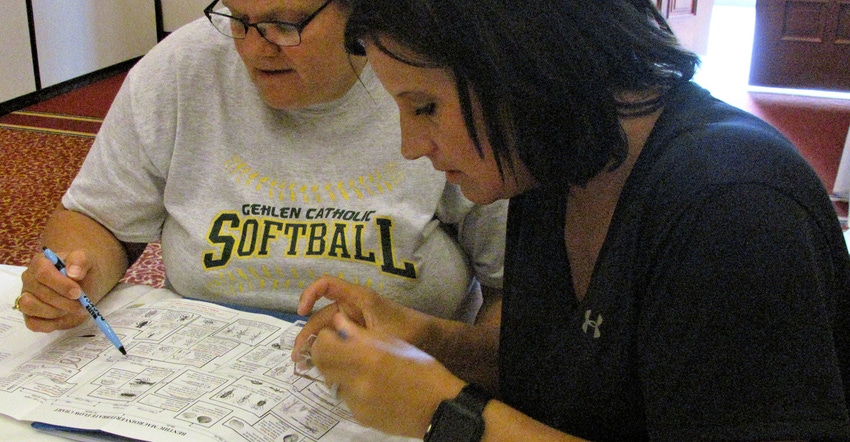November 8, 2018

By Ann Staudt
Take a group of K-12 teachers from across Iowa, a team of dedicated researchers, experts and educators. Mix in fun, food, music and games, such as Habitat Hopscotch and Wetlands Bingo. Put them all together for two June days at Iowa State University, and you’ve got the latest edition of the Water Rocks! Teacher Summit.
The 10th summit hosted 12 teams comprised of 28 teachers who learned more about water quality, biodiversity and the science of conservation, and how to impart those lessons to their students.
Water Rocks is well-known across Iowa for its classroom visits and school assemblies teaching K-12 students about water quality and the environment using a combination of music, science, games and hands-on experiences. The Teacher Summit lets educators dig into the process of teaching these lessons, and Water Rocks provides them with the resources to implement the lessons in their classrooms.
Hands-on teacher training
The two-day program combined lectures from ISU faculty and Extension, and Iowa DNR experts, with hands-on learning activities and experiential training in how to teach the lessons.
All Water Rocks programs include evaluation and feedback tools to ensure continuous improvement. While the teachers’ pre-assessment scores were in line with previous summits, at 54% proficiency, the post-assessment scores at this summit rose to a new high of 82% proficiency, a cumulative increase of some 28%. The greatest improvements were in the areas of understanding and addressing environmental issues at a 38% increase, and knowledge of environmental processes and systems with an uptick of 31%.
Feedback from participants was particularly positive with regards to how the program provided good science and research-based information, and followed it up with ways to make it relevant in the classroom. Many participants noted that the musical and game elements will not only be appealing to their students but were confident that the materials could easily be adapted to meet any grade-level needs.
Providing ‘real’ learning experiences
Jesse Vander Weerdt, a teacher from Ankeny Centennial High School, says the program reminded him to bring fun back into the classroom while making the learning “real” for his students, so they can understand these lessons impact them personally: beyond the semester and the classroom. Others were grateful for materials and approaches that follow the Next Generation Science Standards being adopted by many schools.
Other parts of the program that drew praise included introduction to pollinators, the importance of biodiversity, and the history and impacts of wetlands conversion to cropland throughout Iowa.
Energizing and empowering teachers with knowledge and teaching tools to address the far-reaching effects Iowans have on their environment is a fundamental tenet for the summit. Several teachers commented that they will be reinforcing existing lessons and curriculum with the lessons learned and the teaching materials provided to all participants.
Bringing lessons to communities, too
The teacher team from Turkey Valley Community School District expressed their excitement in what they learned, noting that the drive home was anything but boring as they recognized no-till, prairie strips, field areas that had lost significant topsoil and previously unobserved wetlands. This group also used the drive to plan ways to bring the lessons to their students and their communities.
The fact that Iowa has lost an inch of topsoil over the past 15 years — which will take some 500 years to naturally replace — resonated with many teachers. Several were ready to incorporate this into lessons on erosion, pollution, environmental studies and geology.
Understanding that all teachers, even STEM teachers, are being asked to do more with less, Water Rocks provided each school team with a comprehensive activity kit to help them implement what they learned at the summit.
The kit includes the hands-on activities and games used during the summit, classroom modules, poster and banners, and all published Water Rocks and Iowa Learning Farms DVDs and print materials. Teachers from elementary, middle and high schools have different requirements for their classrooms, but the broad scope of resources provided to each participant will make it easy to adapt.
Helping educate next generation
Educating the next generation with fact- and science-based approaches to improving water quality and re-energizing natural ecosystems is the core mission of Water Rocks. To date, summit workshops have reached 199 teachers, 13 middle school and high school students trained as peer mentors, and 62 university Extension and environmental educators.
Staudt is Water Rocks! director and manager and content specialist for Iowa Learning Farms.
You May Also Like




